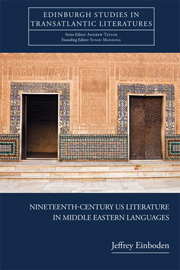Introduction
Published online by Cambridge University Press: 05 October 2013
Summary
This study addresses the translation of nineteenth-century US literature into Middle Eastern languages, concentrating on Hebrew, Arabic and Persian renditions of seminal American authors. A book devoted to such a subject has a wide variety of potential motivations and directions, including those which could be classed broadly as historical, political and linguistic. While informed by each of these disciplinary contexts, the primary focus of the present study is textual transformation and endurance, exploring the literary implications of particular acts of translation; rather than a broad, external outline of Middle Eastern reception, I trace the revisionary processes engendered within specific Middle Eastern renditions, offering close readings of Hebrew, Persian and Arabic versions of Longfellow, Irving, Hawthorne, Melville and Whitman. I argue that these selected translations not only exemplify the intriguing problem of transporting US texts into arenas of Middle Eastern language, but also serve as useful tools for re-reading canonical US authors themselves, accenting and illuminating aspects of the ‘American Renaissance’ customarily hidden. The study aims to provide not a niche transmission history for linguistic or regional specialists, but rather a detailed account of individual Middle Eastern renditions which expand, enrich or challenge our reading of their nineteenth-century US sources.
In emphasising Middle Eastern contexts for US literature, this study reflects an increasingly prevalent critical perspective within American studies, one which seeks to relocate the national canon within a global frame, expanding the interpretive boundaries for authors conventionally identified as distinctly or exceptionally ‘American’.
- Type
- Chapter
- Information
- Publisher: Edinburgh University PressPrint publication year: 2013

